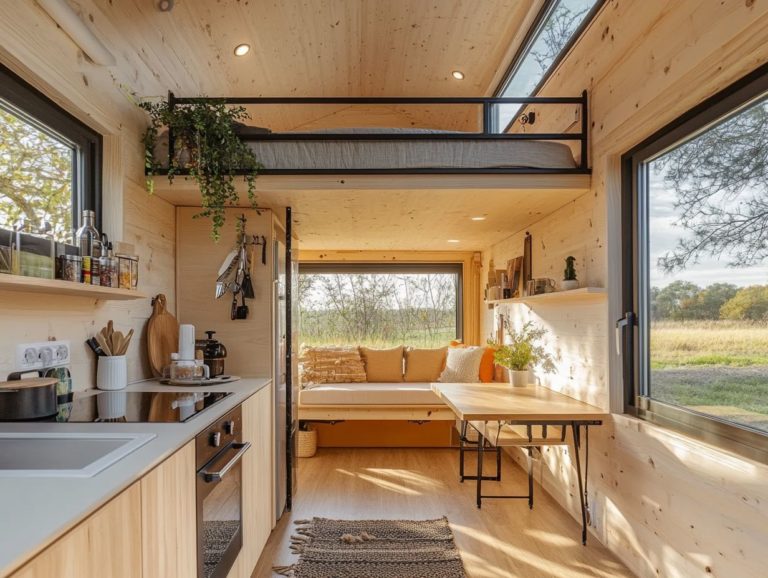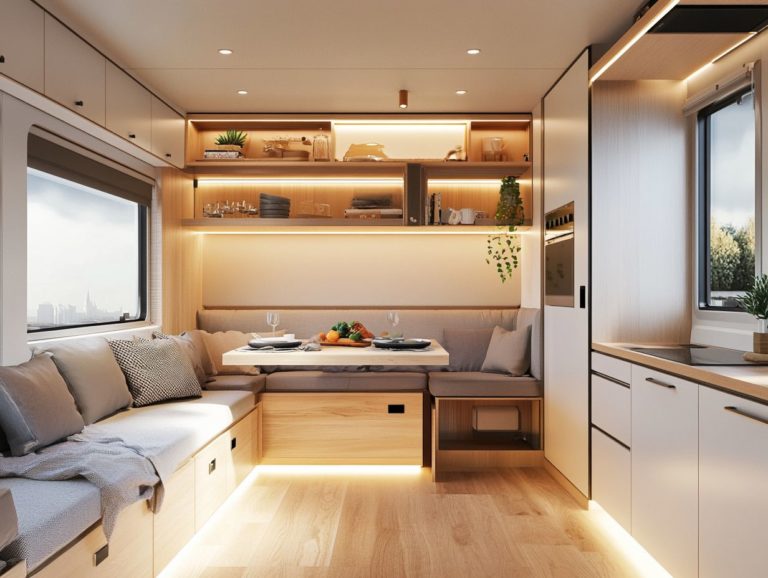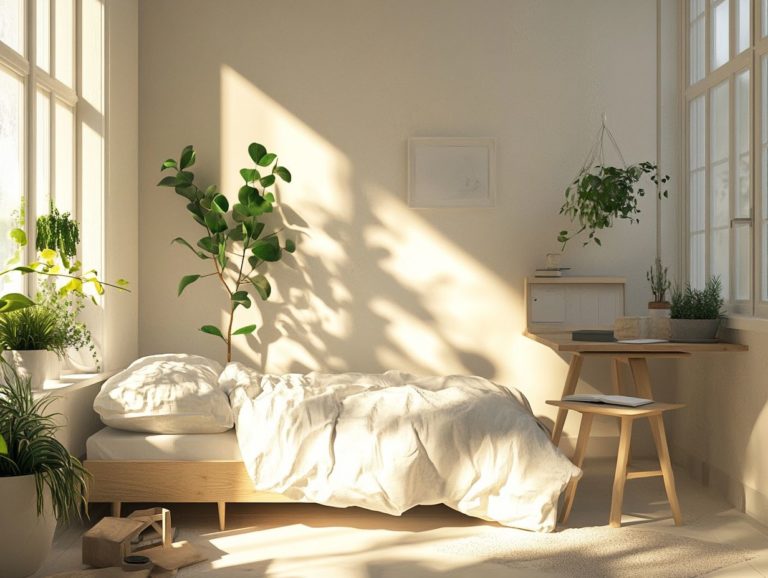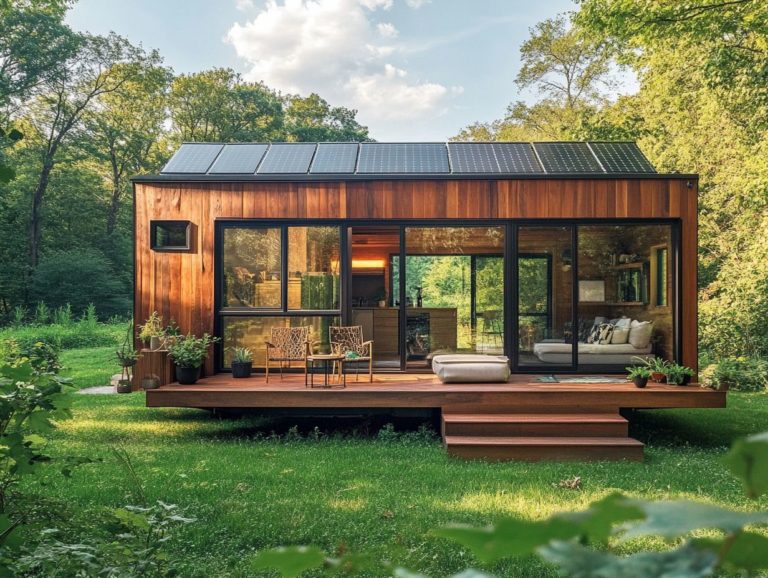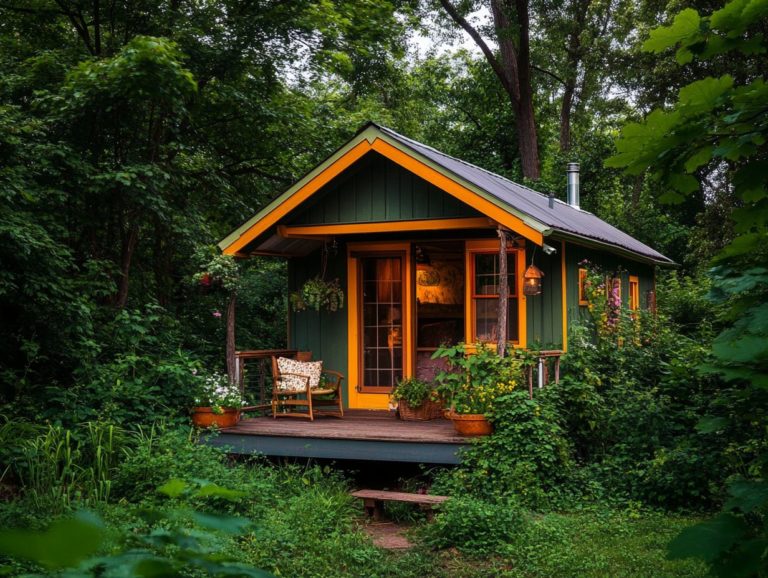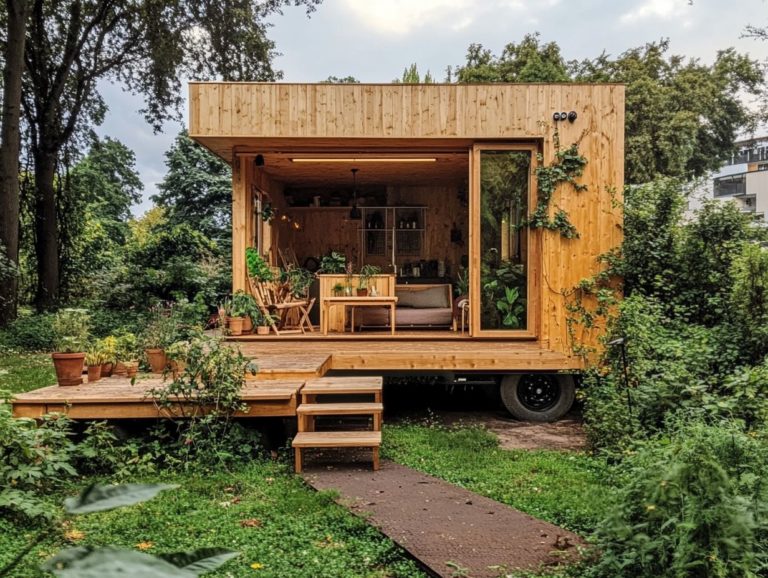The Psychology Behind Tiny Living
Explore tiny living now to transform your life! Tiny living is a way of living that resonates with your innate desires for simplicity and mindfulness.
This exploration delves into the psychology of living and minimalism. It illustrates how decluttering can yield significant mental health benefits, including reduced stress and enhanced creativity.
Though transitioning to a smaller living space presents its challenges, employing practical strategies can ease the journey.
Uncover the allure of tiny living, including options like portable cabins, which can have a profound impact on your overall well-being.
Contents [hide]
Key Takeaways:
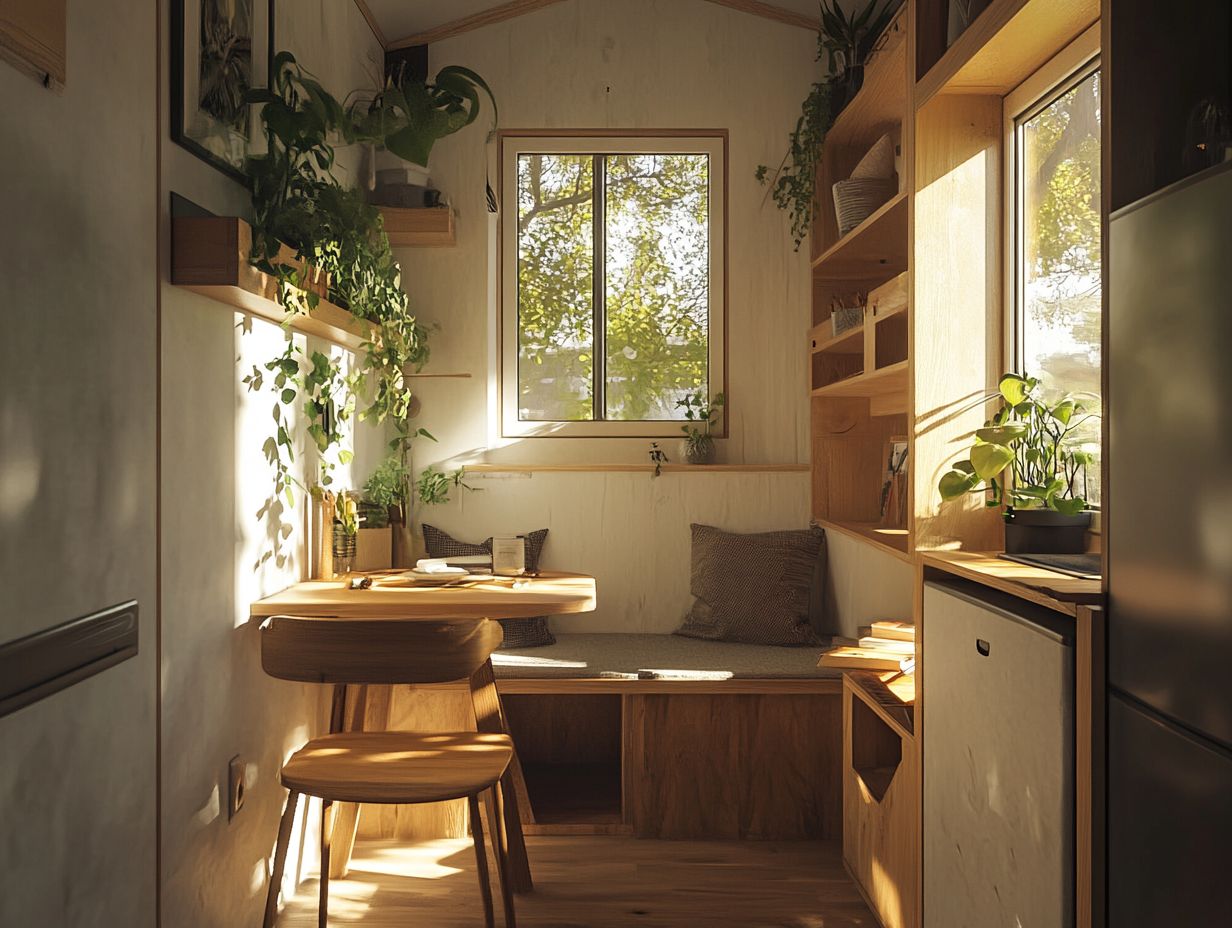
- Living in a tiny space can lead to a more minimalist mindset, creating a sense of calm and simplicity in our lives.
- Tiny living can have significant positive effects on mental health, including reducing stress and anxiety, as well as boosting creativity and productivity.
- It’s important to address potential obstacles when transitioning to tiny living, such as limited choices. However, practical strategies can help make the transition smoother and more successful.
Defining Tiny Living and Its Appeal
Tiny living, with its embrace of tiny houses, micro-apartments, and portable cabins, presents a lifestyle that speaks to your yearning for simplicity and tranquility in a world full of chaos.
As urban spaces become more congested, you may find yourself drawn to the tiny house movement. This movement champions the idea of minimizing your footprint while enhancing your quality of life.
The appeal goes beyond just the space; it also encompasses the mental clarity that comes from living intentionally. This aligns with your values around using fewer resources and caring for the environment.
This choice fosters self-sufficiency and demonstrates a commitment to affordable housing solutions, especially in bustling cities like New York City and San Francisco.
The concept of tiny living extends beyond traditional tiny houses. It includes innovative designs like micro-apartments that maximize efficiency in urban settings. These compact homes not only help lower housing costs but also nurture a sense of community by connecting you with like-minded residents who prioritize sustainability and minimalism.
As society increasingly seeks emotional well-being amid fast-paced lifestyles, the rise of tiny living signals a shift toward valuing experiences over material possessions. This trend invites you to embrace mindfulness, engage with nature, and cultivate meaningful relationships, ultimately enriching your urban experience.
The Psychology of Minimalism
The psychology of minimalism examines how decluttering and simplifying your living space can profoundly impact your emotional well-being. It enhances mental clarity and focus.
As you embrace minimalism, you may discover that its psychological benefits reach far beyond aesthetics. They cultivate a deeper connection to your values and encourage a lifestyle rich in intentional choices.
By aligning your life with these values through mindful consumption which means being intentional about what you buy and resource conservation, you can experience a liberating escape from the chaos that often accompanies modern urban living.
Exploring the Mindset of Minimalism
Exploring the mindset of minimalism offers a life-changing way to elevate simplicity and environmental consciousness, beautifully illustrated by the tiny house movement. This perspective encourages you to critically evaluate your possessions and lifestyle choices.
By fostering a liberating sense of freedom from material clutter and housing crowding often found in urban settings, you embrace minimalism. You cultivate a deeper understanding of your true needs and desires, steering your life toward intentionality, where emotional well-being takes precedence over consumerism and purposeful design.
Focusing on the essentials nurtures relationships and experiences that genuinely enhance your quality of life, rather than simply amassing more things. This lifestyle can change how you live every day, inspiring you to spend more time outdoors, engage in sustainable practices, and make mindful purchases that resonate with your values.
The tiny house movement exemplifies these principles. Living in smaller spaces can significantly reduce your environmental footprint while fostering a sense of community connection. This lifestyle champions reduced consumption and aligns seamlessly with the growing awareness of ecological impact, creating a harmonious relationship between minimalism and environmental stewardship.
Benefits of Tiny Living for Mental Health
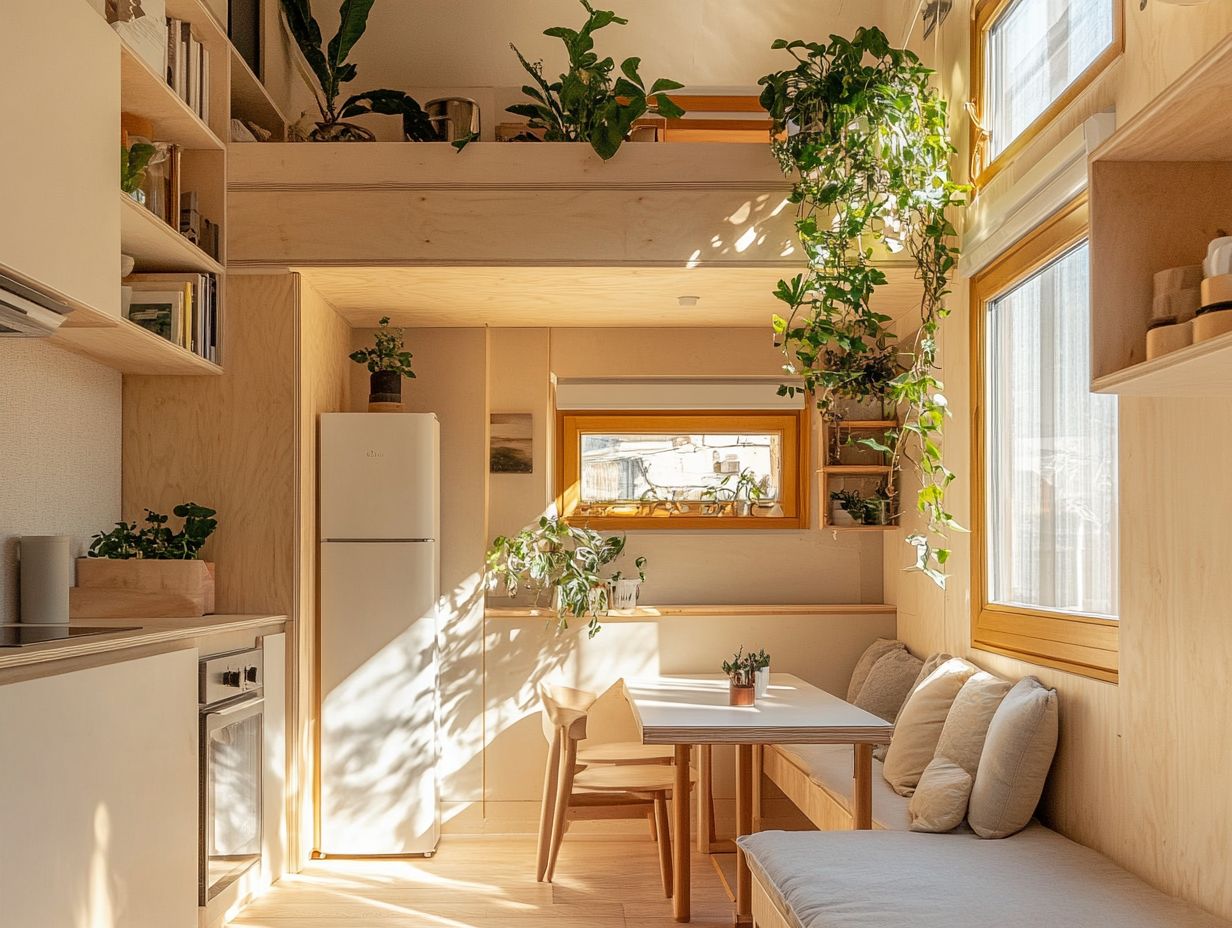
The benefits of tiny living for mental health go far beyond the act of downsizing. They encompass profound psychological and emotional advantages that pave the way for a healthier, more fulfilling lifestyle.
- Choosing to reside in smaller spaces can reduce stress and anxiety, as a simplified environment promotes mindfulness and tranquility.
- Individuals embracing the tiny house movement frequently report stronger community connections and improved resource conservation habits.
- Many also experience a notable enhancement in their emotional state.
Tiny living emerges as a compelling alternative for those seeking to elevate their mental health.
Reducing Stress and Anxiety
Reducing stress and anxiety is one of the standout benefits of tiny living. The simplicity of a tiny home often leads to a calmer emotional state. When you minimize physical clutter, you can also declutter your mind, dramatically cutting down on stress and inviting relaxation.
With intentional design elements, tiny homes create a harmonious living environment that encourages mindfulness and tranquility. They are perfect for anyone looking to escape the pressures of modern life and can have a positive impact on mental health.
Many who embrace this lifestyle report newfound clarity and focus. The absence of excess allows them to concentrate on what truly matters. One person shared how living in a tiny home transformed their daily routine, inspiring them to engage in enriching activities like meditation and nature walks, which significantly lifted their mood. This shift in perspective is part of transforming mindset for tiny house living.
Research suggests that smaller spaces strengthen connections with loved ones, reducing feelings of isolation and fostering emotional support.
Ultimately, tiny living isn t just about downsizing; it s about cultivating a richer, more rewarding life experience where emotional well-being flourishes amidst simplicity, significantly influenced by The Anxiety Toolkit.
Try embracing tiny living today for a happier, more peaceful life!
Boosting Creativity and Productivity
Imagine boosting your creativity and productivity by embracing tiny living! The thoughtful design of tiny homes helps enhance focus and inspires new ideas. With fewer distractions and streamlined spaces, you ll likely find yourself feeling more motivated and creative. This enables you to pursue your passions with greater effectiveness.
The freedom of movement in small spaces encourages a dynamic lifestyle. It makes it easier for you to switch between tasks and think outside the box.
The intentional use of multi-functional furniture furniture that serves more than one purpose, like a sofa bed and open layouts creates an adaptable environment, perfect for brainstorming or crafting. This versatility optimizes your space and fosters an innovative mindset. It allows you to easily tailor your surroundings to fit various activities.
Living simply in a tiny home cultivates a minimalist mindset, which is a way of thinking that focuses on having less, helping you appreciate what truly matters. This mindset prompts you to prioritize essential tools and resources that ignite joy and creativity. For a deeper understanding, exploring the psychology of space in tiny living can provide valuable insights. Ultimately, this leads to a more fulfilling and productive life, where each day brings opportunities for inspiration and growth.
Challenges of Tiny Living
Despite its many benefits, tiny living comes with its share of challenges that you must deal with. Limited housing options and the reality of overcrowding in urban areas can complicate your transition to a tiny lifestyle.
It s important to recognize these obstacles if you want to transition to tiny living. You may find yourself grappling with self-sufficiency and the adaptability needed to thrive in a small space.
Addressing Potential Obstacles
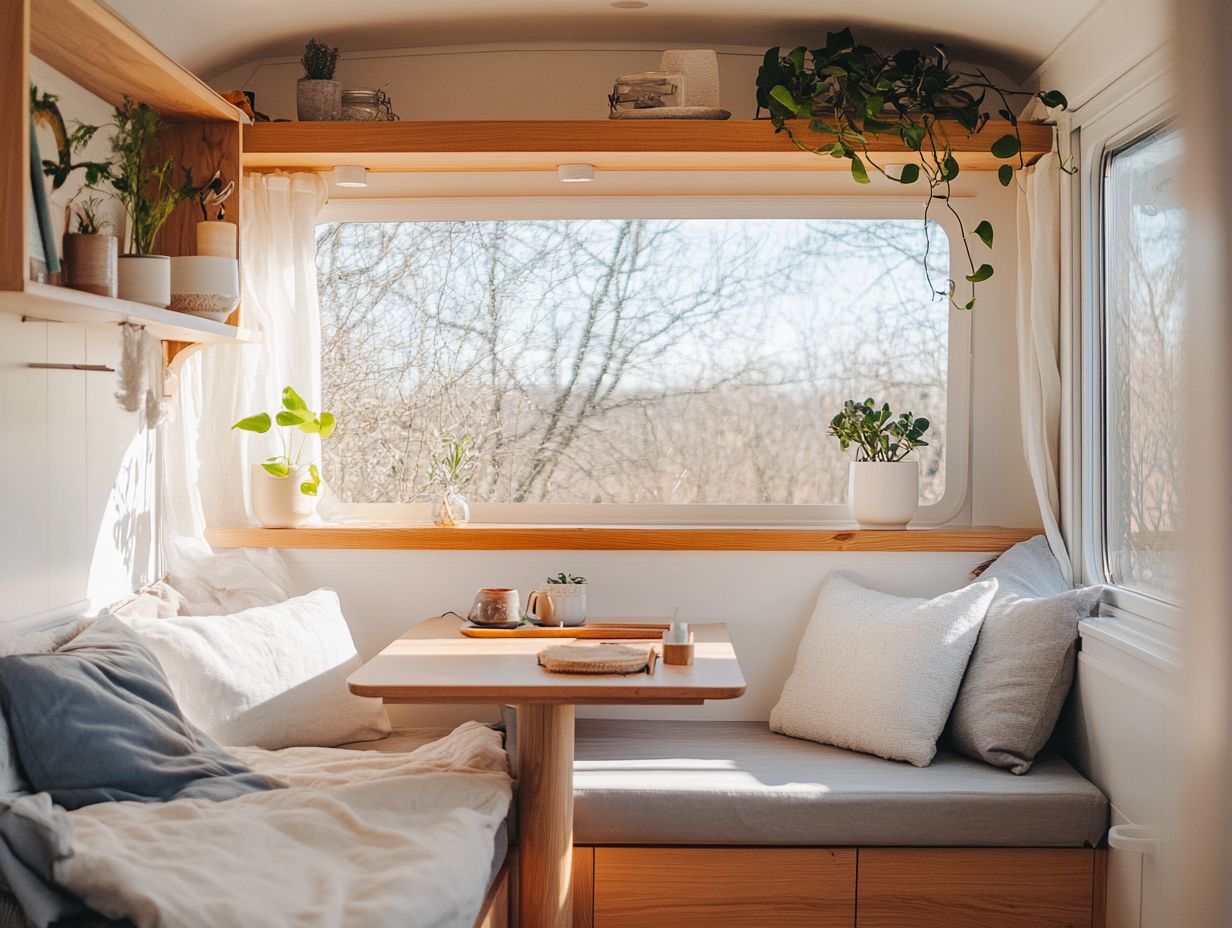
Addressing potential obstacles in tiny living requires you to engage in proactive planning and commit to resource conservation. This will allow you to maximize your living experiences. Common challenges include storage limitations, societal perceptions of tiny homes, and the quest for community attachment in smaller neighborhoods.
By identifying these hurdles and implementing practical solutions think creative storage ideas and fostering community relationships you can truly thrive in a tiny living environment.
When tackling issues like limited space, consider investing in dual-purpose furniture that not only saves room but also enhances the aesthetic appeal of your compact home. Changing misconceptions about tiny living often involves engaging with your neighbors and sharing personal stories that highlight the benefits of minimalism. Additionally, exploring the relationship between sustainability and tiny living can further enrich your experience.
This approach fosters an inclusive atmosphere where shared values around sustainability can flourish. Exploring local networks can also encourage collaboration and resource-sharing, transforming feelings of loneliness into a vibrant community spirit. Ultimately, these strategies elevate your individual experience and contribute to a richer, more sustainable lifestyle.
Tips for Embracing Tiny Living
Ready to change your life? Here are some tips to help you embrace tiny living with ease! Embracing tiny living can truly transform your lifestyle, and implementing practical strategies is essential for a seamless transition into this rewarding way of life.
From decluttering your possessions to prioritizing simplicity, these strategies can significantly enhance your emotional well-being and pave the way for a more intentional existence.
By adopting mindful practices and honing in on what truly matters, you can cultivate a fulfilling life in your tiny home.
Practical Strategies for a Successful Transition
Practical strategies for making a successful transition to tiny living involve careful planning, changes in feelings, and cultivating a sense of community. If you re relocating to a tiny home, start by crafting a detailed plan that includes decluttering your belongings, embracing simple living without excess stuff, and seeking out local communities that celebrate tiny living.
Building connections with like-minded individuals can make your transition smoother and provide the essential support you need during this significant life change.
Letting go of possessions can bring up feelings of loss. Focus on the newfound freedom that comes with simplicity; this mindset can ease your transition.
Joining community groups, both online and in person, helps you share experiences and find encouragement. This builds a strong sense of belonging.
This exciting approach not only tackles the practical logistics but also nurtures your emotional resilience, making your journey to tiny living more fulfilling and sustainable.
Frequently Asked Questions
Why is tiny living so appealing?
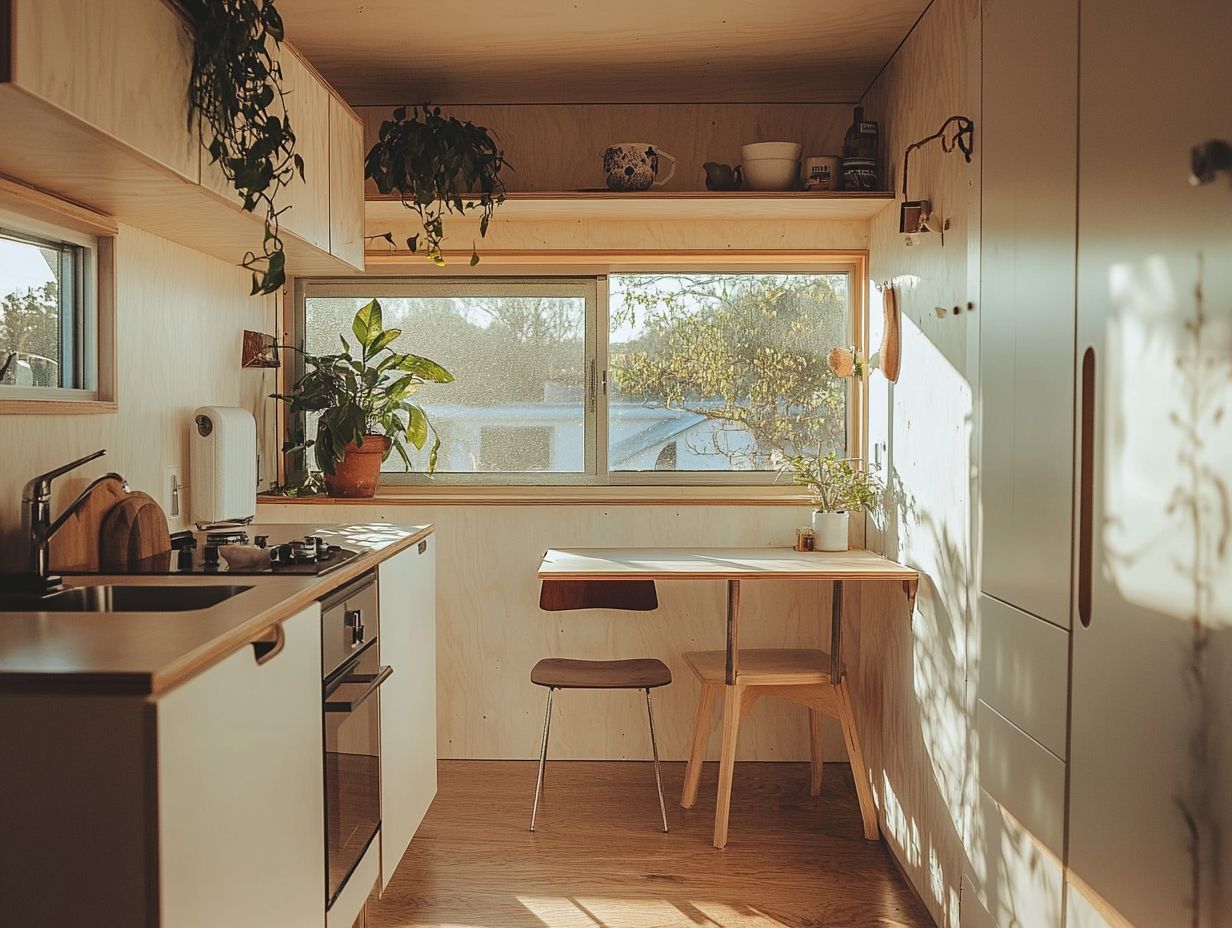
The psychology behind tiny living reveals the emotional reasons behind choosing to live in a small, minimalist space. This could include a desire for simplicity, a need for financial freedom, or a search for a more environmentally-friendly lifestyle.
How does tiny living affect mental health?
Tiny living can have both positive and negative effects on mental health. On one hand, it can promote a sense of freedom, simplicity, and gratitude. However, it can also lead to feelings of claustrophobia, isolation, and stress if not managed properly.
Why do people choose to live in tiny homes?
People choose to live in tiny homes for various reasons, including a desire for financial freedom, a need for a more minimalist lifestyle, a longing for a simpler way of living, or a wish to reduce their environmental impact.
What are some psychological benefits of tiny living?
Some psychological benefits of tiny living include increased feelings of freedom and independence, reduced stress and anxiety, and a greater appreciation for the little things in life.
What are some challenges of living in a tiny home?
Challenges of living in a tiny home may include a lack of space and storage, difficulties with zoning and regulations, and potential strain on relationships with others living in the tiny home.
Is tiny living for everyone?
No, tiny living is not for everyone. It requires a certain mindset and lifestyle, and some people may not feel comfortable or happy living in a small space. It is important to assess one’s own needs and desires before making the decision to live in a tiny home.

